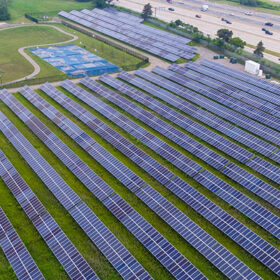Vote Solar is among the leading solar advocacy groups in the U.S., operating since 2002. The organization brings policy and technical expertise, coalition building and public engagement to drive outcomes to support the solar industry and its end users.
The organization focuses on five areas, including access and equity, rooftop solar, community solar, utility-scale solar, and grid modernization.
In Q1 2024 alone, Vote Solar was involved in 56 legislative campaigns across 14 states, 41 regulatory proceedings across 17 states, filed 28 expert testimonies, and held 10 workshops and webinars. Below are five accomplishments from the first quarter of 2024.
1) Colorado
Vote solar engaged utility PSCo during the development of its 2024-26 transportation electrification plan. The Colorado Public Utilities Commission approved rebates for electric vehicle charging and wiring for low-wealth and equity-eligible customers, helping expand EV charging access to a broader set of residents. The Commission also proposed expanding criteria for income-qualified customers, helping move towards leveling the playing field of EV charging access.
2) New Jersey
New Jersey launched an equity-focused community solar bill early this year. Vote Solar helped negotiate changes in program rules that made the program more beneficial to low-income ratepayers and community solar providers. It also created a requirement for utilities to share data for municipal demand aggregation and changed requirements for customers. Further, it built in a self-attestation feature into the community solar sign-up process, eliminating the need for a “complicated and risky” verification process.
3) Michigan
The Michigan Public Service Commission issued a decision that directed the utility to be more transparent with reporting grid data as it relates to equity, said Vote Solar. The commission also ruled to support deeper community engagement in future distribution system planning, a pilot program to help medically vulnerable low-wealth customers utilize federal incentives for solar, storage and energy efficiency, and programs to increase energy security to prevent heat-driven illnesses and deaths.
4) North Carolina
North Carolina recently approved PowerPair, a residential solar and storage pilot program. Vote Solar worked alongside stakeholders to reach a settlement that addressed issues around net metering in the program. It successfully created incentives for new rooftop solar customers. The program created a cap of 7,000 customers and up to $5,400 in storage incentives per customers. Utility Duke Energy also committed to develop another pilot program for solar and storage to support electric reliability for customers dependent on medical devices.
5) Pennsylvania
Pennsylvania just passed a community solar bill in the House with bipartisan support. The bill would expand access to solar, tap federal funds for low-income ratepayers, and prohibit upfront fees or credit checks for potential solar customers. It would also ensure prevailing wage payments for workers developing community solar projects and would safeguard consumer access and protections.
This content is protected by copyright and may not be reused. If you want to cooperate with us and would like to reuse some of our content, please contact: editors@pv-magazine.com.








By submitting this form you agree to pv magazine using your data for the purposes of publishing your comment.
Your personal data will only be disclosed or otherwise transmitted to third parties for the purposes of spam filtering or if this is necessary for technical maintenance of the website. Any other transfer to third parties will not take place unless this is justified on the basis of applicable data protection regulations or if pv magazine is legally obliged to do so.
You may revoke this consent at any time with effect for the future, in which case your personal data will be deleted immediately. Otherwise, your data will be deleted if pv magazine has processed your request or the purpose of data storage is fulfilled.
Further information on data privacy can be found in our Data Protection Policy.